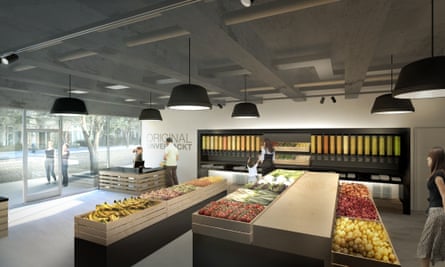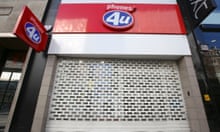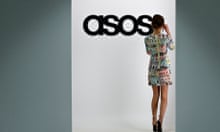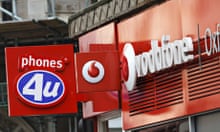It works like this. You bring your own containers and have those weighed. Berlin-based supermarket Original Unverpackt labels your containers. You shop. When you get to the till, the weight of your containers is subtracted and you pay for the net weight of your groceries. The label is designed to survive a few washings so you can come back and skip the weighing process for a while.
Founders Sara Wolf and Milena Glimbovski say there’s a rising demand for products and services that deal with sustainability and that people demand alternatives to the “lavish” handling of our resources.
“Here, the customer only takes what they need,” says Wolf and Glimbovski ahead of the launch of their Berlin-Kreuzberg shop. “We’d like to offer an alternative way of shopping - one where we offer everything you need but you won’t find hundreds of different types of body lotion or olive oil.”
Original Unverpackt isn’t a new idea. Austin, Texas, has In.Gredients and Catherine Conway founded London-based Unpackaged - first in Islington in 2007 before it moved to Hackney in 2012. It closed the following year after the original business model changed to include a restaurant and a bar. All three are independent shops exploring the psychology of food and consumption.
“If you are trying to counter the modern way of ready-to-assemble food, then you have an uphill climb,” says Conway. Food in this extreme, where a ready-made curry in a plastic box gets zapped into something you stick in your face, has been divested of any of its pleasurable aspects and is treated as fuel. “It’s nothing to do with the products you have on offer, it’s more to do with the psychology of marketing and being sold the idea of time saving ways of eating.”
In 2011, the UK produced nearly 11m tonnes of packaging waste. Yet companies still sell packaged, pre-peeled bananas.
Food waste campaigner Tristram Stuart, says supermarkets have cottoned onto the ‘ethical consumer’. “The food and packaging industry has undergone a strategic rebranding campaign [and now] argues that you can reduce food waste by how it’s packaged. So you get pots of cubed-up mango instead of an actual mango. We then buy supermarket branded reusable shopping bags which we hang in our hallways which turn our homes into billboards for these places. It’s a distraction from the real issue which is turning nature into cash to satisfy unnecessary consumer desires.”

There is an argument that opening unpackaged stores in neighbourhoods with a high proportion of upwardly mobile hipsters out-prices the poorer, local communities. Original Unverpackt says it “would like to offer this new way of shopping to a broad range of customers” including those on small budgets, but admit that their Berlin-Kreuzberg shop sits next to a vegan burger restaurant and ‘alternative’ environments can’t help but be tainted by middle-class privilege.
“The original idea for Unpackaged was to make organic food cheaper for people on low incomes if we removed the packaging,” says Conway. “I didn’t have the buying power to drop my prices. Yet when I price checked something like organic oats, I found that a supermarket would charge more than I did.” What Conway was trying to do, she says, “was to see if we could set up a social franchise model that catered to a local community, local tastes and local incomes”.
Brighton-based social enterprise hiSbe offers an unpackaged section within a more conventional supermarket. Emphasis is on locally-sourced products and its business model includes pricing transparency - so you know how much of your pound goes towards the supplier, staff wages and so on. They want to make ethical and sustainable shopping the norm.
Ultimately the issue isn’t how sustainable or ethical your purchase is, but whether you should be buying it at all. “We continue to exploit resources and extend our agricultural development into the world’s last remaining forests displacing both indigenous populations and natural habitats so we can have strawberries in December,” says Stuart. “Is it possible to make the kind of societal changes to make us live in symbiosis with all the world’s creatures? Yes, but at the moment there are no significant global trends that point in that direction.”
Selling unpackaged groceries is a progressive concept borne out of the bulk buying trends of the 1980s, but it is only part of a solution towards less industrialised consumption. It’s one of the myriad of options pushed out to people as alternative ways of buying. We’re getting better with managing waste - nearly 70% of the UK’s waste is recovered or recycled compared to 27% in 1998. But it is a drop in the ocean when you consider the vast quantities disposed of by China, Russia and the United States.
An unfortunate side effect with every sustainable or ethical business is that regardless of the altruism behind each recycled, upcycled, unpackaged or renewable product is that sustainability ultimately means the sustainability of profit, not planet.
Read more like this:
- Would you eat lab grown meat to save the environment? - poll
- Share your pictures of good and bad packaging
- Advertisement feature: Quiz: how much does the world waste?
The circular economy hub is funded by Philips. All content is editorially independent except for pieces labelled advertisement feature. Find out more here.
Join the community of sustainability professionals and experts. Become a GSB member to get more stories like this direct to your inbox








Comments (…)
Sign in or create your Guardian account to join the discussion